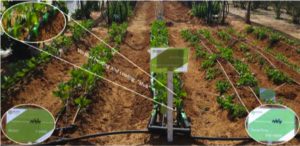Roots Sustainable Agricultural Technologies Limited (ASX: ROO, Roots or Company) is generating interest in its protein planting program for the meat replacement market and is currently in discussions with a European consultancy group and a bio-based company to apply for a Euro bi- national grant between Israel and Holland. The application will involve three companies, two of which must be European based.
Roots is examining the impact of its RZTO technology on increasing the protein content in organic crops. The concept is currently being tested on four high protein crops at the company’s research hub in Bet Halevi, Israel, with planting commencing on 10 September 2019. These crops will utilise Roots’ upgraded RZTO technology, including its newly released heat exchange stub. Results will be compared to control crops.
The protein planting program is supported by previous Root Zone Temperature Optimisation (RZTO) results, which has led to an increase in the volume and weight of the roots as well as an increase in the vegetative activity of the plant, therefore increasing the total biomass of plants. These observations and RZTO results suggest that the heating and cooling of plant roots may potentially increase total protein content and will be used by Roots to lead the organic segment of the artificial meat replacement industry, which currently relies on industrially grown, high protein crops with heavy use of herbicides and pesticides.
High-value protein laden crops are suitable for indoor growing where organic methods cater to a lucrative organic meat replacement niche.
If Roots is able to successfully increase the protein content of crops, it could result in increased cost efficiencies for growers and farmers using the RZTO system.

The growing trend towards artificial and alternative meats is continuing. In the US, fast-food chains such as McDonald’s and Burger King have been fast to release their own artificial meat offering. In Australia, artificial meats have also grown in popularity, with Hungry Jacks releasing a plant-based meat “Rebel Whopper” burger in stores across the country.
Roots is also considering other opportunities in the artificial meat market that are complementary to its technologies and will advise the market accordingly in due course.
Roots CEO, Dr. Sharon Devir said, “Increasing consumer concerns about the environmental and health impacts of meat coupled with a changing approach from the food industry to create meat alternatives has contributed to the large growth in the meat-replacement market.
“Our technology enables year-round production with relative low energy demand, decreasing the environmental impact. The organic meat replacement segment is emerging as a significant opportunity for Roots’ root zone heating and cooling technology and we see benefits for high-value crops grown indoors organically.”




